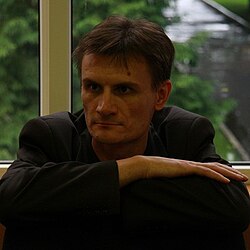Denis Denisenko: Difference between revisions
migrating Persondata to Wikidata, please help, see challenges for this article |
Rescuing 1 sources and tagging 0 as dead. #IABot (v1.3beta4) (DragonflySixtyseven) |
||
| Line 71: | Line 71: | ||
==External links== |
==External links== |
||
*[http://bigdenru.livejournal.com/ LiveJournal] |
*[https://web.archive.org/web/20061019180313/http://bigdenru.livejournal.com/ LiveJournal] |
||
*[http://hea.iki.rssi.ru/~denis/ Home Page] |
*[http://hea.iki.rssi.ru/~denis/ Home Page] |
||
Revision as of 23:03, 5 April 2017
Denis Denisenko | |
|---|---|
 | |
| Born | January 16, 1971 Moscow, USSR |
| Nationality | Russian |
| Citizenship | Russian Federation |
| Alma mater | Moscow Institute of Physics and Technology |
| Known for | Discovery of supernovae, cataclysmic variables, gamma-ray bursts studies, asteroidal occultations |
| Scientific career | |
| Fields | Astronomy, Astrophysics |
| Institutions | Sternberg Astronomical Institute |
| Patrons | Vladimir Lipunov |
Denis Denisenko (born 16 January 1971) is a Russian astronomer of the late 20th – early 21st century, discoverer of 7 supernovae, more than 50 variable stars, and asteroid, and a comet.
Biography
Born in 1971 in Moscow, Denisenko graduated from Moscow Institute of Physics and Technology (MIPT or Phystech) in 1993 with a Master of Science in Astrophysics and a Diploma: Spectral Properties of Gamma-Ray Bursts Observed by PHEBUS Instrument of the Granat observatory. In 1991, he joined the High Energy Astrophysics Department of the Russian Space Research Institute (IKI) where he worked until April 2012. He was a visiting observer at the TUBITAK National Observatory (TUG) between 2002 and 2007. Since May 2012 he works at the Space Monitoring Laboratory of Sternberg Astronomical Institute of Moscow State University (SAI MSU). He is the author of more than 30 scientific articles, 250 astronomical telegrams and the presenter of talks at several international conferences.
He has been an amateur astronomer since 1977, a member of the Moscow Astronomy Club since 2002 and the head of a working group on asteroidal occultations. He participated in Astrofests 2001–2006 and was a speaker at Astrofest 2005, 2006 and 2013. He is an active enthusiast of professional-amateur collaboration in astronomy and long-time contributor to IOTAoccultations, Planoccult, meteorobs, comets-ml, MPML, SeeSat, AAVSO-HEN, AAVSO-DIS, vsnet-alert, vsnet-outburst, cvnet-discussion mailing lists. He is the owner and moderator of five Russian astronomy mailing lists (komety, pokrytie, rusmeteors, moscow-astro, varstars) and author of a few popular articles in Zemlya i Vselennaya (Earth and Universe) magazine. He was mentioned in Sky and Telescope twice and gave interviews on Russian News Service, Radio Liberty, Gazeta.ru newspaper, and the BBC Russian Service in 2007.
Major discoveries
- Deep Eclipses in the Cataclysmic Variable 1RXS J020929.0+283243 (2005) – the binary system with 4.5m eclipse amplitude.
- Optical Afterglow Candidate of GRB 920925C (2007) – the "prehistoric" Gamma ray burst with the optical afterglow found on the Palomar plate.
- NSV 1485 Correct Identification and Period Determination (2007)[1]
- V713 Cep Eclipses and Period Measurement (2007)[2]
- Supernova 2011hz[3]
- Supernova 2011ip[4]
- MASTER OT J211258.65+242145.4 (2012)[5] – WZ Sge-type cataclysmic variable with 7 rebrightenings.
- MASTER OT J042609.34+354144.8 (2012)[6] – the first dwarf nova in the hierarchical system with a common proper motion companion.
- Supernovae 2013hi, 2013hm, 2013ho, 2014af, 2014am[7]
- Potentially Hazardous Asteroid 2014 UR116[8]
- Comet C/2015 K1 (MASTER)[9]
Other achievements
- Variable stars discoveries[10]
- Prediction of the first stellar occultation by the Transneptunian Object (2004)[11]
- Discovery of Minor Planet 2005 UN1
- Occultation of 2UCAC 31525121 by (130) Elektra – the first successful observation of an asteroidal occultation from Turkey (2007)[12]
- Correctly identified what was thought to be asteroid 2007 VN84 as the Rosetta probe[13][14]
- Listed at Marquis Who's Who in Science and Engineering 10th Anniversary Edition 2008–2009
- Occultation of TYC 5161-00925-1 by (2) Pallas (2011) – the first successful observation of a kind from Moscow[15]
References
- ^ vsnet-alert 9557: Possible NSV 1485 outburst
- ^ V713 Cep Eclipses and Period Measurement
- ^ CBET 2909
- ^ CBET 2932
- ^ Astronomer's Telegram #4208
- ^ Astronomer's Telegram #4441
- ^ List of Recent Supernovae
- ^ MPEC 2014-U121
- ^ MPEC 2015-K70
- ^ Variable Stars discovered by DDE
- ^ "Occultations of HIP and UCAC2 stars downto 15m by large TNO in 2004-2014". 28 February 2004. Retrieved 26 November 2012.
- ^ 2007 European Asteroidal Occultation Results
- ^ MPEC 2007-V70
- ^ "'Deadly asteroid' is a spaceprobe". Skymania. 10 November 2007. Retrieved 1 September 2010.
- ^ Our astronomers report (in Russian)
Literary works (in Russian)
- Hide away – Den is comin'! (1997) – book of ironic parodies on Russian ironist Andrey Knyshev.
- Was N.A. Morozov right, or Dating the Denderah Zodiacs (1992)
